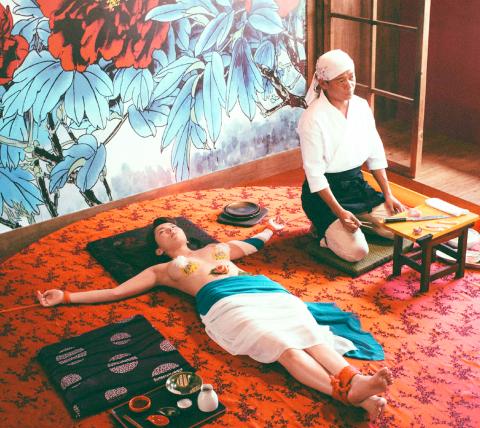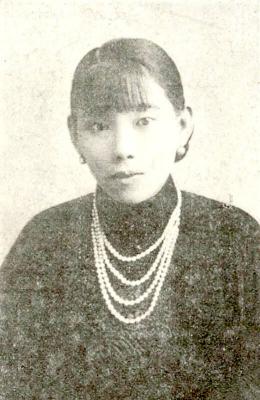A Japanese porn star, sushi and a gay man known for his mastery of fellatio are the elements that promise an evocative film about food and sex. But director Pan Chih-yuan (潘志遠) quickly exposes his filmmaking incompetence in Sashimi (沙西米) and kills the story. Also gone to waste is the potentially interesting cast led by Lee Kang-sheng (李康生) — muse to auteur Tsai Ming-liang (蔡明亮) — and Yui Hatano, a big-name star in the world of Japanese adult video (AV).
The film opens with Hatano going through the motions of a sex act in an adult video. The pixelated close-up of her face reveals an empty simulation of eroticism. It is a stroke of genius, but unfortunately, the whole film quickly goes downhill after the opening scene. Set in the immediate aftermath of the Tohoku earthquake and tsunami in 2011, the drama revolves around Natsumi (Hatano), a porn star who learns that her boyfriend is HIV-positive. Taking advantage of the rumor that she died in the devastating tsunami that struck Fukushima, Natsumi leaves her old life behind and comes to stay at a bed and breakfast in Taiwan with her agent, Tamura (Iguchi Daiyu).
What brings Natsumi to the B&B is its owner and sashimi chef Chen-ming, played by Lee.

Photo courtesy of Good Day Films
At the B&B, things start spinning out of control with the arrival of Natsumi. Having enjoyed Chen-ming’s sashimi so much that she has formed a habit of exchanging sex for food, waitress Hsiao-ming (Teresa Daley, 紀培慧) is driven mad with jealousy at Chen-ming’s passion for Natsumi.
Meanwhile, Chen-ming is determined to find out who Natsumi really is. Years ago, the chef prepared a banquet of nyotaimori, a Japanese culinary practice that involves serving sushi on a naked woman’s body, with his then-wife Yoshiko as the living sushi platter. The banquet went terribly wrong, prompting the wife to leave. He’ll now perform the same culinary ritual on Natsumi to see if his suspicions are correct.
Pan’s cinematic approach to sex and eroticism is tedious and bland. Even the nyotaimori scene is lifeless.

Photo courtesy of Good Day Films
The film further suffers from a lack of coherence and focus. In between the boring sex scenes, some cheap laughs are thrown in, awkwardly delivered by a few sidekicks, including the character played by Daiyu, a Tokyo gay bar owner-turned-celebrity after giving a blow-job to an AV actor adept at holding back orgasm and making the man come in a television show. The instant celebrity, like the rest of the cast members, is merely used to move the tedious story to its end.
Wedding a high-profile cast with a script to explore the rarely visited territory of sex and sexuality, Sashimi surely started out as an ambitious project, which makes it more regrettable that it’s a tedious flop.

Many people noticed the flood of pro-China propaganda across a number of venues in recent weeks that looks like a coordinated assault on US Taiwan policy. It does look like an effort intended to influence the US before the meeting between US President Donald Trump and Chinese dictator Xi Jinping (習近平) over the weekend. Jennifer Kavanagh’s piece in the New York Times in September appears to be the opening strike of the current campaign. She followed up last week in the Lowy Interpreter, blaming the US for causing the PRC to escalate in the Philippines and Taiwan, saying that as

This year’s Miss Universe in Thailand has been marred by ugly drama, with allegations of an insult to a beauty queen’s intellect, a walkout by pageant contestants and a tearful tantrum by the host. More than 120 women from across the world have gathered in Thailand, vying to be crowned Miss Universe in a contest considered one of the “big four” of global beauty pageants. But the runup has been dominated by the off-stage antics of the coiffed contestants and their Thai hosts, escalating into a feminist firestorm drawing the attention of Mexico’s president. On Tuesday, Mexican delegate Fatima Bosch staged a

Nov. 3 to Nov. 9 In 1925, 18-year-old Huang Chin-chuan (黃金川) penned the following words: “When will the day of women’s equal rights arrive, so that my talents won’t drift away in the eastern stream?” These were the closing lines to her poem “Female Student” (女學生), which expressed her unwillingness to be confined to traditional female roles and her desire to study and explore the world. Born to a wealthy family on Nov. 5, 1907, Huang was able to study in Japan — a rare privilege for women in her time — and even made a name for herself in the

Taiwan can often feel woefully behind on global trends, from fashion to food, and influences can sometimes feel like the last on the metaphorical bandwagon. In the West, suddenly every burger is being smashed and honey has become “hot” and we’re all drinking orange wine. But it took a good while for a smash burger in Taipei to come across my radar. For the uninitiated, a smash burger is, well, a normal burger patty but smashed flat. Originally, I didn’t understand. Surely the best part of a burger is the thick patty with all the juiciness of the beef, the